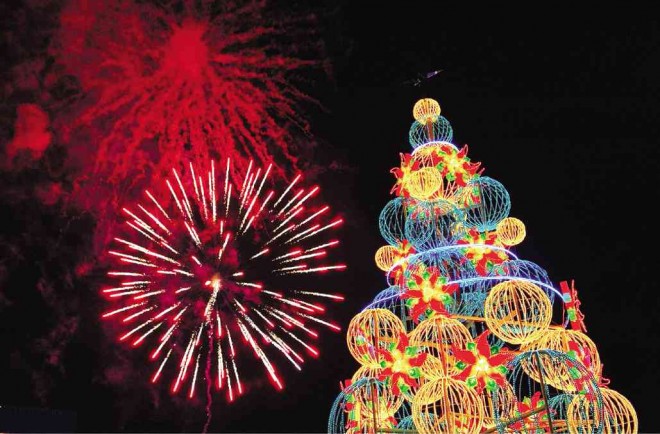Baguio cops on alert for ways to skirt ’cracker ban

FIREWORKS during a lantern parade by students of St. Louis University brighten up downtown Baguio City on Dec. 1 after the city government switched on this year’s Baguio Christmas tree. The city continues, however, to enforce a ban on firecracker use by individuals not taking part in any community event. EV ESPIRITU/INQUIRER NORTHERN LUZON
BAGUIO CITY—The city government has not been issuing permits to vendors of firecrackers and pyrotechnic products in the summer capital, in support of the health community’s “Iwas Paputok” campaign.
But vendors have found a way to skirt authorities, an official of the Bureau of Fire Protection (BFP) said.
BFP personnel have started inspecting boarding houses, transient homes and inns in the wake of reports that vendors have been stocking firecrackers and pyrotechnic products in these places, said Baguio fire marshal Joe Fernand Bangyod.
He said fire prevention officials were also monitoring bus terminals because tourists bring firecrackers here, unaware that a city policy discouraging the sale and use of firecrackers is being enforced.
“[Vendors, who sneak in firecrackers and pyrotechnic products], usually travel to Baguio on Dec. 21 and Dec. 27. We start inspections of bus stations during this period, and we coordinate with drivers to check if their passengers have firecrackers with them,” Bangyod said at a forum here on Wednesday.
Article continues after this advertisementHe said keeping these highly flammable products could cause fire, especially in the city’s villages where transient homes are located.
Article continues after this advertisementA proposed ordinance declaring a total ban on the sale of firecrackers is pending in the city council. But Mayor Mauricio Domogan has refused to allow firecracker sales, citing his mandate to protect public health and safety and the city’s environment.
Instead, the mayor has urged vendors to participate in the bids and awards processes for supplies for community events involving the use of firecrackers and pyrotechnic products.
Last year, Baguio Retailers of Paputok, Lucis (Pailaw) Atbp. Association sold their wares along a section of Marcos Highway in Tuba town in Benguet province, after they were rejected by Domogan.
The vendors’ group has again applied for permits to sell in Tuba, the Inquirer learned.
The BFP Cordillera office said seven fires in the region, from December 2013 to January 2014, were caused by improper handling and storage of firecrackers. The number was fewer than the 12 firecracker-related fires recorded in 2012.
The Department of Health (DOH) in the Cordillera recorded 58 firecracker-related injuries in 2012 and 52 injuries in 2013.
“There is no safe firecracker. We do not promote any kind of firecrackers. There are other ways to produce noise to celebrate New Year, like [using your] car horns, gongs and even plates,” Dr. Amelita Pangilinan, DOH Cordillera assistant director, said. Desiree Caluza, Inquirer Northern Luzon